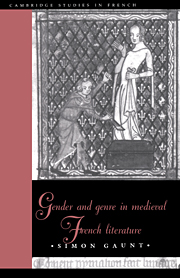Book contents
- Frontmatter
- Contents
- Acknowledgements
- List of abbreviations
- Introduction
- 1 Monologic masculinity: the chanson de geste
- 2 The knight meets his match: romance
- 3 Troubadours, ladies and language: the canso
- 4 Saints, sex and community: hagiography
- 5 Genitals, gender and mobility: the fabliaux
- Conclusion
- Notes
- Bibliography
- Index
- CAMBRIDGE STUDIES IN FRENCH
Conclusion
Published online by Cambridge University Press: 24 August 2009
- Frontmatter
- Contents
- Acknowledgements
- List of abbreviations
- Introduction
- 1 Monologic masculinity: the chanson de geste
- 2 The knight meets his match: romance
- 3 Troubadours, ladies and language: the canso
- 4 Saints, sex and community: hagiography
- 5 Genitals, gender and mobility: the fabliaux
- Conclusion
- Notes
- Bibliography
- Index
- CAMBRIDGE STUDIES IN FRENCH
Summary
The texts examined in this book do not in practice treat gender as a rigid, immutable, or ‘natural’ phenomenon. The roles ascribed to men and women, the meanings attached to categories like ‘masculine’ and ‘feminine’ are not stable in Old French and medieval Occitan literature. On the contrary, they are constantly renegotiated. This fluid and dynamic picture of gender is largely the result of a process modern criticism calls intertextuality: the impulse to reproduce, reshape or contest models of masculinity and femininity drawn from earlier or contemporary texts ensures transformation, not stasis or stability. Even where the intention appears to be to reproduce, recover, or maintain an earlier paradigm, the production of a new text in itself leads to mobility. Thus, for example, Ami et Amile registers nostalgia for a model of male bonding predicated on the similarity and unity of men, which the single manuscript invites us to read in relation to the Roland tradition; yet in making Ami and Amile more like each other than were Roland and Oliver, in suppressing the differences between a pair of heroes who obviously recall their illustrious predecessors, textual difference is produced. The model of masculinity represented by the Roland tradition and Ami et Amile is thereby shown to be subject to reshaping and reinterpretation from within the tradition which produces it, even without overt contestation.
There is, however, plenty of overt contestation.
- Type
- Chapter
- Information
- Gender and Genre in Medieval French Literature , pp. 286 - 289Publisher: Cambridge University PressPrint publication year: 1995



